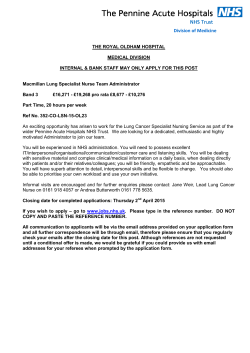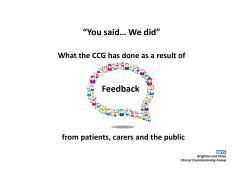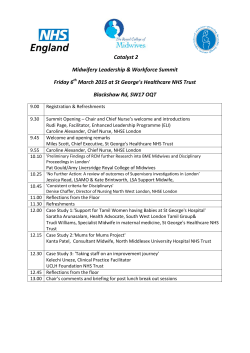
Good Health - Dr Phil Hammond
Good Health Daily Mail, Tuesday, April 7, 2015 Page 35 By Dr PHIL HAMMOND pathologists and other experts offering their opinions. Ask if you can attend, or at least have someone report back to you. W ASKING THE most DIFFICULT QUESTIONS hen I first walked on to an NHS ward, in 1984, patients were often discouraged from taking an active part in their own care. Some weren’t even told if they had a serious diagnosis, such as cancer or dementia. We assumed that you weren’t able to ontribute, didn’t want to know, or that c telling you might make you more anxious and unable to cope. And doctors didn’t waste emotion or energy on those difficult conversations about death and disability. But not knowing your diagnosis meant you couldn’t possibly participate in crucial decisions about your care, involve your loved ones or plan properly for the future. So patients had to fend for themselves. Thankfully, times have changed. Evidence now suggests that the more involved you are — and are allowed to be — as a patient, the more likely you are to get the right care for you. Humans often take the path of least resistance and, when you’re ill, it’s usually easiest to lie back and let the professionals get on with it. But if you have a long-term illness, there comes a time when you need to get more involved and speak up, so your care can be built around your needs and priorities. One of the reasons why this matters is that there is always an element of luck involved in healthcare. An incorrect initial or provisional diagnosis happens around 15 per cent of the time, and it’s hard to ignore the fact that there has been wrong — even negligent — care in the NHS. As someone who helped to expose the Bristol baby heart surgery scandal in the Nineties, and as a doctor myself, I know mistakes can be made. But as a patient, you can help keep these to a minimum by being actively involved at every step. That means checking your diagnosis, chasing results and referrals, choosing the treatment you think is best for you and the team you believe is best placed to deliver it, finding out about your illness, treatment, rights and standards, and checking they are followed, and doing all you can to stick to the plan and recover. Like learning to swim, learning to be a more active patient requires knowledge, skills and courage. But once you’ve cracked it, it stays with you for life. TAKE YOUR MEDICAL RECORDS WITH YOU Picture: getty Survival guide all NHS patients must read One of the biggest frustrations for people using the NHS is lack of continuity. It’s very hard to build relationships with staff when you rarely see the same person twice and often have to repeat your story. Carrying a printed copy of your medical records with all the key information — current problems, medical history, investigations, drugs, allergies and copies of letters — can make a huge difference. To get hold of your records, ask your GP or hospital (search nhs.uk for information). Some practices give you easy access to your medical records online. Your GP’s website could be as good as the one set up by GP Dr Amir Hannan at htmc.co.uk Dr Hannan responded to the challenge of taking over the medical practice of murderer Dr Harold Shipman, who killed at least 250 patients, by making it into one of the most honest, transparent and technologically savvy in the UK. voice are all very revealing. Often, He realised he had to re-establish doctors are typing up the previous trust — and one way to do that was patient’s notes when you enter. By to enable as many patients who putting your hand out and waiting wanted it to have complete access until it’s shaken, you can get them to to their medical records. focus on you. Some NHS staff will He began by offering all patients a always shake your hand, smile and copy of their records on a portable introduce themselves, but not all do. USB memory stick. Now, he offers So it’s good if you take the initiative. them the same service online. Patients can book appointments It makes the consultation a meeting and order prescriptions online, of experts from the outset — you’re update information and correct their an expert in your illness and how own records if they want to. you live your life; your doctor is an Your GP may offer this service, too. expert in trying to improve your life. Many miss out on better care simply , by not realising it exists — so ask. A leading doctor’s insider tips on getting the treatment you need THE HANDSHAKE AND HELLO TECHNIQUE START every consultation by giving whoever you are seeing a firm handshake. Look them in the eye and say ‘hello’. This is important for a number of reasons. It helps you to connect with each other from the start — touch, eye contact, body language and tone of Some doctors and patients worry that shaking hands risks passing on infections, but you can (and should) wash them afterwards. Once, a patient washed his hands in my sink, then asked me to do the same, before he shook my hand. THE TESTS YOU DON’T REALLY NEED Modern medicine is heavily reliant on diagnostic tests: 70 to 80 per cent of all healthcare decisions affecting tape YOUR CONSULTATIONS Many mobile phones have a recording facility, and your GP or consultant shouldn’t mind if you record a consultation for personal use and to inform your carers. Some patients say it helps to listen back, away from the stress of the medical setting. Also, most people forget most of what was said in a consultation. You can take a friend in, too. It may also be useful to take notes while you’re in your consultations to refer back to. diagnosis or treatment are influenced by laboratory medicine results, and they also play a big part in screening and monitoring — particularly in the management of chronic conditions. How many of these tests are really needed and make a difference to the care you receive is hard to say. How likely a test is to be accurate doesn’t just depend on the result, but also on how likely you are to have the disease in the first place. The lower risk you are, the less likely you are to benefit from any test, and the more likely you are to be harmed by a ‘false positive’ result and unnecessary treatment. In general, you should never make a decision for or against treatment on the basis of one test. The NHS should treat you — not just your test results — and reach a most-likely diagnosis based on all the evidence. If your case is complicated, it’s likely to be discussed at a multi disciplinary team meeting with all the specialists involved in your care, These are the kind of questions you might want to ask any person treating you for a serious, lifethreatening or life-limiting disease: n Are you a specialist for this particular condition? n What are the pros and cons of each option for me? n What are your personal (or your team’s) outcome figures for each of these options, and how do they compare with the NHS average? n Do you know of any other specialist team in the NHS with more expertise than you, or who can offer me options you’re not able to? For any treatment, you need the name of someone — for example, a senior doctor or nurse — who is ultimately accountable for your care, agrees with your goals and is your ‘go-to’ person for serious concerns. If you get access to a specialist nurse, it can make a huge difference to the quality of your care. They give you knowledge, skills, confidence, courage, kindness and laughter. It’s no coincidence that when the NHS has failed badly, often in the care of the most vulnerable or elderly patients, a recurring theme is there were simply not enough specialist nurses to provide safe care to patients with very complex needs. To find services patients rate highly, visit iwantgreatcare.org and patientopinion.org.uk. To read inspection reports, visit cqc.org.uk KNOW WHAT YOU’RE ENTITLED TO Getting the right diagnosis and treatment first time won’t always happen — but it’s more likely if you understand what should be happening to you and the standard of care you should be getting. For just about every mental and physical illness, and for social care, there are agreed standards of care you should be getting, and clear information for patients and carers on the NICE website, nice.org.uk (click on the menu at the top that says ‘Standards and Indicators’). Spend time getting to know the standard of care you should expect. For example, if you have any chronic disease, you should have a care plan you have agreed to and understood, with clear instructions as to what to do if your illness flares up. Many patients don’t even know they’re entitled to it. Once you know what care you should be getting, you can figure out how much you can do for yourself and what you need help with. Asking for help is a lot easier when you know what you’re talking about. For information on care and choices, healthtalk.org is superb, featuring a range of illnesses and health-related issues via real-life experiences. GETTING THE RIGHT TREATMENT FOR YOU Every illness has more than one treatment option, including not to treat (‘watchful waiting’). You may opt to do whatever the doctor in front of you suggests, or you may scour the NHS for the topperforming unit for your condition and try to get a referral there. There is usually more than one treatment option and sharing that decision, understanding the risks and benefits and agreeing what’s best for you is more likely to be successful than just going along with a doctor’s opinion. Most decisions don’t need to be rushed. Take time to weigh up the risks and benefits before proceeding. If you’re offered a test or treatment, ask: ‘How likely am I to benefit from this?’ and ‘What is most likely to happen if we did nothing?’ Then you can decide what’s right for you. … AND KEEP YOUR EYES WIDE OPEN Patients and carers can sense how safe an NHS ward or surgery is within minutes of stepping through the door. If it appears to be chaotic, Turn to next Page
© Copyright 2025













